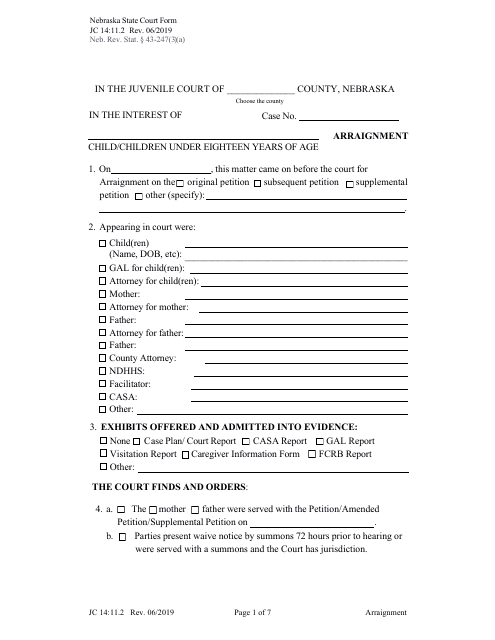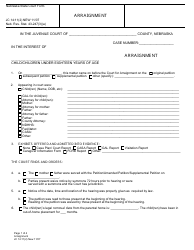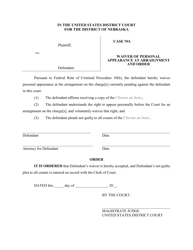Form JC14:11.2 Arraignment - Nebraska
What Is Form JC14:11.2?
This is a legal form that was released by the Nebraska Juvenile Court - a government authority operating within Nebraska. As of today, no separate filing guidelines for the form are provided by the issuing department.
FAQ
Q: What is JC14:11.2?
A: JC14:11.2 refers to a specific form used for arraignments in Nebraska.
Q: What is an arraignment?
A: An arraignment is a court hearing where a person charged with a crime is formally presented with the charges against them.
Q: What happens during an arraignment?
A: During an arraignment, the defendant is informed of their rights, the charges against them, and is given the opportunity to enter a plea (guilty, not guilty, or no contest).
Q: Why is an arraignment important?
A: An arraignment is important because it ensures that the defendant is aware of the charges against them and has the opportunity to respond to those charges.
Q: Who is present during an arraignment?
A: During an arraignment, the judge, the defendant, their attorney (if they have one), and the prosecutor are usually present.
Q: What happens if a defendant pleads guilty during an arraignment?
A: If a defendant pleads guilty during an arraignment, the case may proceed to sentencing, or in some cases, a plea bargain may be negotiated.
Q: What happens if a defendant pleads not guilty during an arraignment?
A: If a defendant pleads not guilty during an arraignment, the case will proceed to trial or other legal proceedings.
Q: What is a plea bargain?
A: A plea bargain is an agreement between the defendant and the prosecutor where the defendant pleads guilty (or no contest) in exchange for a lesser charge or a reduced sentence.
Q: Can a defendant change their plea after an arraignment?
A: In some cases, a defendant may be able to change their plea after an arraignment, but it may require the approval of the court and the agreement of the prosecutor.
Form Details:
- Released on June 1, 2019;
- The latest edition provided by the Nebraska Juvenile Court;
- Easy to use and ready to print;
- Quick to customize;
- Compatible with most PDF-viewing applications;
- Fill out the form in our online filing application.
Download a fillable version of Form JC14:11.2 by clicking the link below or browse more documents and templates provided by the Nebraska Juvenile Court.
















